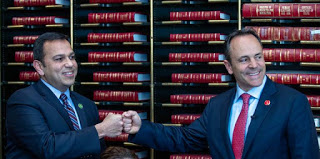State Sen. Ralph Alvarado, Bevin’s running mate and a physician, agrees with him that state shouldn’t require kids to be vaccinated

State Sen. Ralph Alvarado and Gov, Matt Bevin bumped fists
as they filed in January. (Photo: Mark Mahan, Lexington Herald-Leader)
—–
Gov. Matt Bevin’s running mate for lieutenant governor told a Northern Kentucky Tea Party group June 27 that he agrees with Bevin on immunization policy, that government shouldn’t require children to be vaccinated.
State Sen. Ralph Alvarado of Winchester, a physician, said “I think it’s good health policy to administer vaccines, but if people don’t want them, we shouldn’t force people to take them.”
Alvarado was recorded by American Bridge, a group supporting Democratic Attorney General Andy Beshear for governor. The group posted the recording on YouTube.
Alvarado “was responding to a question about a student in Northern Kentucky who had been pulled out of school for refusing to get the chickenpox vaccine,” reports Daniel Desrochers of the Lexington Herald-Leader. “The debate over vaccines has captured national attention as the anti-vaccine movement has contributed to a rise in measles cases in the U.S.”
Kentucky only allows medical and religious exemptions. In 2017 the Bevin administration made it easier for parents to invoke the religious exemption. They can now download a form, have it notarized and submit it to their school upon enrollment, instead of having to get a signed form from a health-care provider. Spectrum News reported that the number of Kentucky parents claiming the religious exemption increased 59 percent in the 2017-18 school year.
A Cabinet for Health and Family Services representative told legislators in 2017 that the changes had been in the works for several years, in response to complaints that a medical entity should not have authority over a religious exemption; that a co-payment was often required to get a provider’s signature; and that parents and guardians were having trouble finding providers to sign the forms.
People with weakened immune systems include those with cancer, especially if they are being treated with an aggressive chemotherapy, people who have had bone-marrow transplants, people who have had an organ transplant, people with auto-immune disorders, like rheumatoid arthritis or Lupus, or people with acquired immunodeficiency syndrome, or AIDS.
“Those people are absolutely reliant upon herd immunity because we can’t immunize them,” Dr. Sean McTigue, an infectious disease specialist at the University of Kentucky, told Kentucky Health News in March. “The only way that we have to protect them is to ensure that everybody around them is immunized so that the chances of them actually coming into contact with somebody who has one of these very infectious viruses or bacteria is very, very low.”
McTigue said herd immunity is vitally important to protect babies, because they can’t be vaccinated for measles, mumps and rubella or chickenpox until they are a year old because these vaccines are made with very weak, but live viruses.
“So, every single baby less than one year old is unvaccinated and unprotected against those conditions,” McTigue said. “And the young babies who cannot yet be immunized against those conditions are exactly the patients that we worry about the most if they get those infections because they are at greatest risk of complications.”